What Is a Data Protection Officer and Do You Need One?
Discover the role of Data Protection Officers (DPOs) in ensuring compliance with data protection laws like GDPR, and find out if your organization needs to appoint one. Learn about their responsibilities, qualifications, and more.
When a business operator realizes they need to comply with the GDPR or any other data protection law, one of the first questions to pop up in their head is: do I need a DPO?
The short answer is - maybe.
In the following few paragraphs, we will dive into the details about data protection officers and will give you an idea of whether you need one.
What is a Data Protection Officer?
A Data Protection Officer (DPO) is an expert responsible for ensuring that an organization complies with data protection laws and regulations. The DPO is responsible for advising the organization on its data protection obligations, implementing and monitoring data protection policies and procedures, Privacy by Design oversight and governance, and responding to data subject inquiries and complaints. (Read our guide on how to handle privacy governance as a small business.)
The role of the DPO is becoming increasingly important as organizations collect and process more and more personal data. Data protection laws and regulations, such as the General Data Protection Regulation in the European Union, impose strict requirements on how organizations can collect, use, and share personal data.
DPO is different from a legal representative in a country. Some data protection laws, such as GDPR and Thailand PDPA, require some foreign businesses to appoint legal representatives in the EU or Thailand to serve as contact points for data subjects with the national authorities or data subjects.
The DPO must be independent in order to carry out their duties effectively. They should not be involved in any decision-making processes that could lead to a conflict of interest. The DPO should have direct access to the highest level of management within the organization.
What are the responsibilities of a DPO?
The tasks of the DPO are defined in Article 39 of the General Data Protection Regulation (GDPR). These tasks include:
- To inform and advise the controller or processor and their employees on their obligations under data protection law;
- To monitor compliance with the GDPR and other data protection laws and with the organization's data protection policies, including managing internal data protection activities;
- To provide advice where a Data Protection Impact Assessment (DPIA) has been carried out and monitor its performance;
- To act as the point of contact for supervisory authorities on issues relating to processing operations;
- To cooperate with the supervisory authority in the performance of its tasks;
- To advise the controller or processor on any data protection-related issues.
In addition to these tasks, the DPO may also be involved in other activities, such as:
- Developing and delivering data protection training to employees
- Managing the organization's data protection risk register
- Reviewing contracts with third-party vendors that process personal data
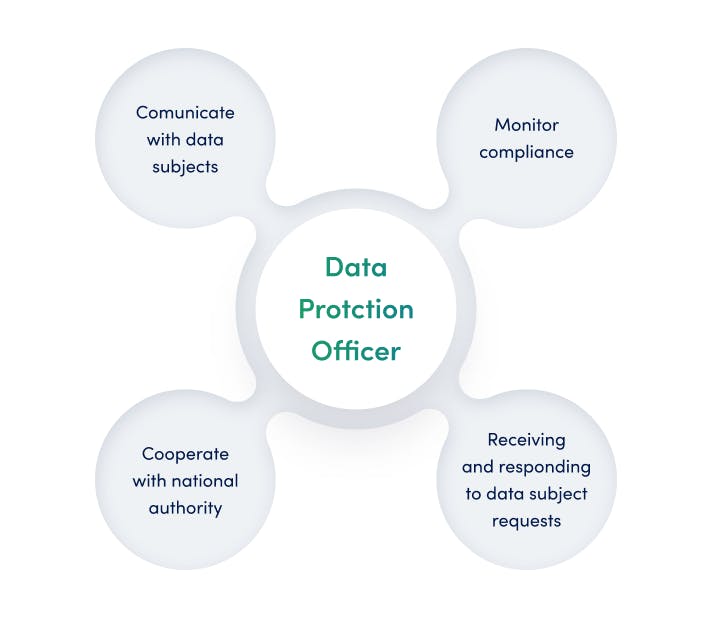
The DPO plays an important role in helping organizations to comply with data protection laws and regulations and in implementing GDPR Privacy by Design principles. The DPO is independent and has direct access to the highest level of management within the organization. This allows the DPO to effectively carry out their duties and ensure that the organization's data protection strategies and data processing operations are aligned with the law.
Who needs to appoint a DPO?
There are several data privacy laws that directly and indirectly require the appointment of a DPO. Here we'll discuss and compare the GDPR, CCPA, LGPD, PIPEDA, PDPA, and POPIA in relation to their DPO requirements.
General Data Protection Regulation (GDPR)
Under the GDPR, organizations are required to appoint a DPO if they:
- Process personal data of EU residents on a large scale
- Process sensitive personal data on a large scale
- Regularly and systematically monitor individuals on a large scale
The GDPR does not define what constitutes "large scale" processing, but it is generally understood to mean processing the personal data of millions of individuals or processing a large amount of sensitive personal data.
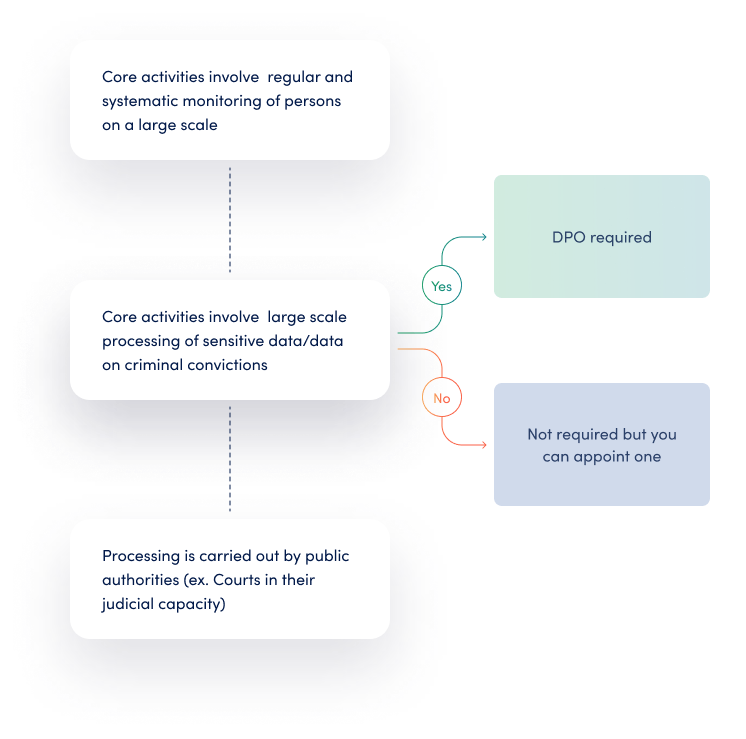
California Consumer Privacy Act (CCPA)
The CCPA does not require organizations to appoint a DPO. However, organizations that collect or process the personal information of California residents are required to designate a responsible person to oversee the organization's compliance with the CCPA. The responsible person can be an employee or a third-party vendor.
Brazilian General Data Protection Law (LGPD)
The LGPD requires organizations that process the personal data of individuals located in Brazil to appoint a DPO if they:
- Offer goods or services to individuals located in Brazil
- Monitor the behavior of individuals located in Brazil, regardless of whether the behavior takes place within or outside of Brazil
- Process personal data on a large scale or process sensitive personal data.
Personal Information Protection and Electronic Documents Act (PIPEDA)
Canada's PIPEDA does not require organizations to appoint a DPO. However, organizations that are subject to PIPEDA are required to designate a privacy officer who is responsible for overseeing the organization's compliance with PIPEDA. The privacy officer can be an employee or a third-party vendor.
Personal Data Protection Act (PDPA)
The Thai PDPA requires organizations that process the personal data of individuals located in Thailand to appoint a DPO if they:
- Process personal data on a large scale
- Process sensitive personal data
- Offer goods or services to individuals located in Thailand
Protection of Personal Information Act (POPIA)
POPIA of South Africa requires organizations that process the personal information of individuals located in South Africa to appoint a DPO if they:
- Offer goods or services to individuals located in South Africa
- Monitor the behavior of individuals located in South Africa, regardless of whether the behavior takes place within or outside of South Africa
- Process personal data on a large scale or process sensitive personal data
Do I need a DPO?
To answer this question, you need to consider the following factors:
- The size and complexity of your organization
- The nature of your organization's data processing activities
- The volume and sensitivity of the personal data that you process
- The applicable data protection laws and regulations
If you are unsure whether or not you need to appoint a DPO, you should consult with a data protection expert.
You’ve Appointed A Data Protection Officer: Now What?
Once you have appointed a DPO, there are a few things you can do to help them get started and succeed:
- Introduce them to the organization and its data processing activities. This will help them to understand the risks involved and the areas where they need to focus their attention.
- Provide them with access to all relevant resources. This includes policies and procedures, data processing agreements, and risk assessments to ensure compliance with relevant data privacy laws.
- Give them the authority to carry out their duties effectively. This means that they should be able to report directly to senior management and have the power to make recommendations and implement changes.
- Encourage them to build relationships with key stakeholders. This includes employees, customers, and regulators.
- Provide them with ongoing training and support. The data protection landscape is constantly changing, so it is important for DPOs to stay up-to-date on the latest developments.
In addition to the above, there are a number of specific tasks that you can delegate to your DPO. These include:
- Developing and implementing data protection policies and procedures
- Conducting data protection impact assessments
- Responding to data subject requests and complaints
- Investigating and reporting data breaches
- Cooperating with supervisory authorities
By delegating these tasks to your DPO, you can free up your time and resources to focus on other areas of the business. This can help you to improve your overall data protection compliance and reduce the risk of data breaches.
Other Frequently Asked Questions
Do all companies require a data protection officer?
No, not all companies require a DPO. The requirement to appoint a DPO depends on the applicable data protection laws and regulations.
Under the GDPR, which is the most comprehensive data protection law in the world, organizations are required to appoint a DPO if they:
- Process personal data of individuals on a large scale
- Process sensitive personal data on a large scale
- Regularly and systematically monitor individuals on a large scale
In addition to the GDPR, there are a number of other data protection laws around the globe that may require organizations to appoint a DPO. For example, the CCPA requires organizations that collect or process the personal information of California residents to appoint a DPO if they meet certain criteria.
Do I need a DPO if I'm a small business owner?
If you are a small business owner who processes the personal data of a large number of individuals, or if you process sensitive personal data, such as health or financial data, it is a good idea to consider appointing a DPO. A DPO can help you to ensure that you are complying with all applicable data protection laws and regulations, and can help you to protect the privacy of your customers and employees.
Do I need a DPO if I am not in the EU?
You are not required to have a DPO if you are not in the EU. However, there are a number of other data privacy laws around the globe that may require you to appoint a DPO. For example, the CCPA requires organizations that collect or process the personal information of California residents to appoint a DPO if they meet certain criteria.
Even if you are not required to have a DPO, appointing one can be a valuable way to demonstrate your commitment to data privacy and to help you comply with all applicable data privacy laws and regulations. A DPO can provide expert advice and guidance on data protection best practices, help you to identify and mitigate data protection risks, and respond to data subject requests and complaints.
Is the DPO responsible for compliance?
The DPO is not personally responsible for compliance. The ultimate responsibility for compliance with data protection laws and regulations lies with the organization's controller or processor. However, the DPO plays a critical role in helping the organization to achieve compliance.
Does the DPO need specific qualifications?
The data privacy laws do not specify any formal qualifications for DPOs, but most of them specify that they must have "expert knowledge" of data protection law and practice. This means that the DPO should have a deep understanding of the data privacy laws, as well as other relevant data protection laws and regulations. They should also have experience in implementing and managing data protection programs.
While there are no formal qualifications required to be a DPO, there are a number of professional certifications that can be helpful for demonstrating the necessary expertise. Some examples of relevant certifications include:
- Certified Information Privacy Professional (CIPP)
- Certified Data Protection Officer (CDPO)
- Fellow of Information Privacy (FIP)
Do I need to be a legal expert to become a DPO?
You do not need to be a legal expert to become a DPO. However, it is important to have a good understanding of data protection law and practice. In addition to knowledge of data protection law, DPOs should also have the following skills and qualifications:
- Understanding of information security and risk management
- Excellent communication and interpersonal skills
- Ability to work independently and as part of a team
- Strong analytical and problem-solving skills
Who is eligible to be a DPO?
Anyone can be eligible to be a DPO, as long as they have the necessary expertise and qualifications, as stated above.
Do I have to appoint a DPO internally?
No, you do not have to appoint a DPO internally. You can also appoint an external DPO, such as a law firm or a privacy consultancy.
Can the DPO be an existing employee?
Yes, an existing employee can be appointed as the DPO. However, it is important to ensure that the employee has the necessary skills and experience, and that they are independent and able to carry out their duties without interference.
Can we share a DPO with other organisations?
Yes, you can share a DPO with other organizations. This is known as a joint DPO. A joint DPO is a DPO who is appointed by two or more organizations to act as their DPO.
Become a Certified Data Practitioner Today
The General Data Privacy Awareness Course provides a general understanding of what it takes to become compliant and stay ahead in the world of data privacy. This affordable course can be completed in less than a day and ends with a small test and certificate upon completion!
Are small businesses required to appoint a DPO?
In general, the legal requirements do not discriminate against business size. All businesses that meet the requirements for appointing a DPO need to do so.
The only exception to this rule comes from the Brazilian LGPD, which excludes small businesses from the duty to appoint a DPO, but underlines that it is a good practice to have one.
The European Data Protection Board in its recommendations on DPOs also recommends appointing a DPO on a voluntary basis as a good business practice.
Who can be a DPO?
Businesses usually have two types of questions about who can be a DPO:
- Does the DPO have to be an employee of the organization? The answer is no. You can assign a DPO from your employees or you can hire someone from outside to fill that role. In fact, there are many agencies that offer DPO-as-a-Service. Data protection laws do not constrain who can be your DPO.
- What are the qualifications requirements for the DPO? Laws do not burden data controllers with requirements regarding the qualifications of DPOs, but controllers are expected to appoint a person who understands the data protection requirements.
Some of the expected qualifications could include:
- Understanding of data processing operations in the company
- Understanding of data protection laws
- Understanding of IT and data security
- Ability to promote data protection in the organization
This is not an exhaustive list. It will be sufficient for some organizations, but not for all. If your company processes personal data on a large scale, it is wise to hire an expert to oversee your processing activities. Such data processing activities involve many risks that should not be left to chance.
What is the position of the DPO?
The Data Protection Officer must be independent in their work. There must be no conflict of interests.
In practice, this means that:
- No one in the organization can instruct the DPO on how to do their tasks
- The DPO must not make decisions on data processing (they can advise, but not make decisions, which excludes the marketing manager from doing DPO work)
- The DPO must not be punished in any way for exercising their duties.
The Data Protection Officer only monitors compliance. They don’t make decisions, but only advise decision-makers on how to comply with the applicable laws.
For example, the marketing manager makes decisions on what third-party tools to use for marketing automation or for advertising. The role of the DPO is to oversee this process and to advise them on whether the chosen tools (data processors) are compliant with the law, whether they collect only the minimum amount of data, and on other data protection issues. They may also recommend compliant tools.
However, the DPO cannot make any decisions. That is why the marketing manager must not be appointed as DPO - there would be a conflict of interest between doing their best in the marketing department and doing their best as a DPO. Sometimes the two are not aligned, so there are some possible conflicts of interest along the way. Learn about the 11 GDPR Marketing Mistakes and How to Fix Them.
What does the DPO need to do?
Having in mind the position of the DPO, their tasks include:
- Identifying processing activities
- Analyzing the activities
- Checking compliance of the processing
- Informing, advising, and issuing recommendations to the data controller.
This is rarely a full-time job, but it is very important. The DPO’s job is to oversee every bit of data processing and ensure that it complies with whatever law applies to such processing. That involves monitoring the personal data from the moment it is collected to the moment it is erased.
Final Thoughts
Appointing a DPO sometimes is a must. In all other situations, it is still a good practice.
Data protection laws, in general, do not burden all companies with DPO requirements. However, it doesn’t mean that you can take data protection lightly. You still need to meet all the legal requirements for compliance. In many cases, having a person dedicated to protecting your users’ data will make things run smoothly.
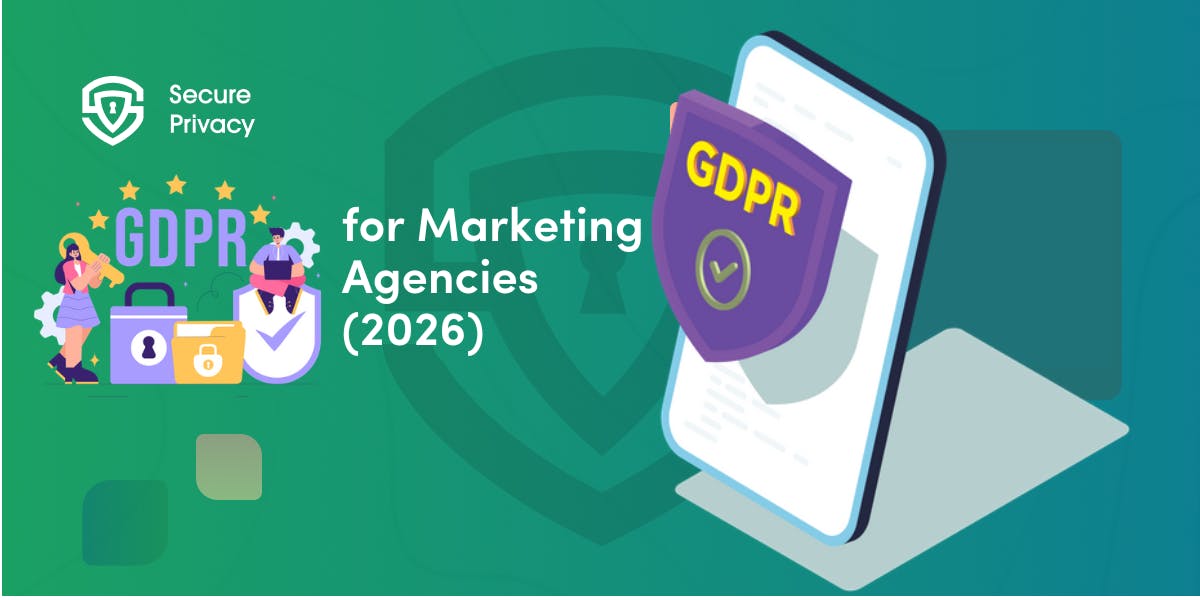
GDPR Compliance Guide for Marketing Agencies (2026)
Marketing agencies operate in a legal grey zone that's rapidly disappearing. You manage client data across dozens of platforms. Your team sets targeting criteria for ad campaigns. You access CRMs, analytics tools, and email systems containing personal data from thousands of end users. Each action creates potential GDPR liability.
- Legal & News
- Data Protection
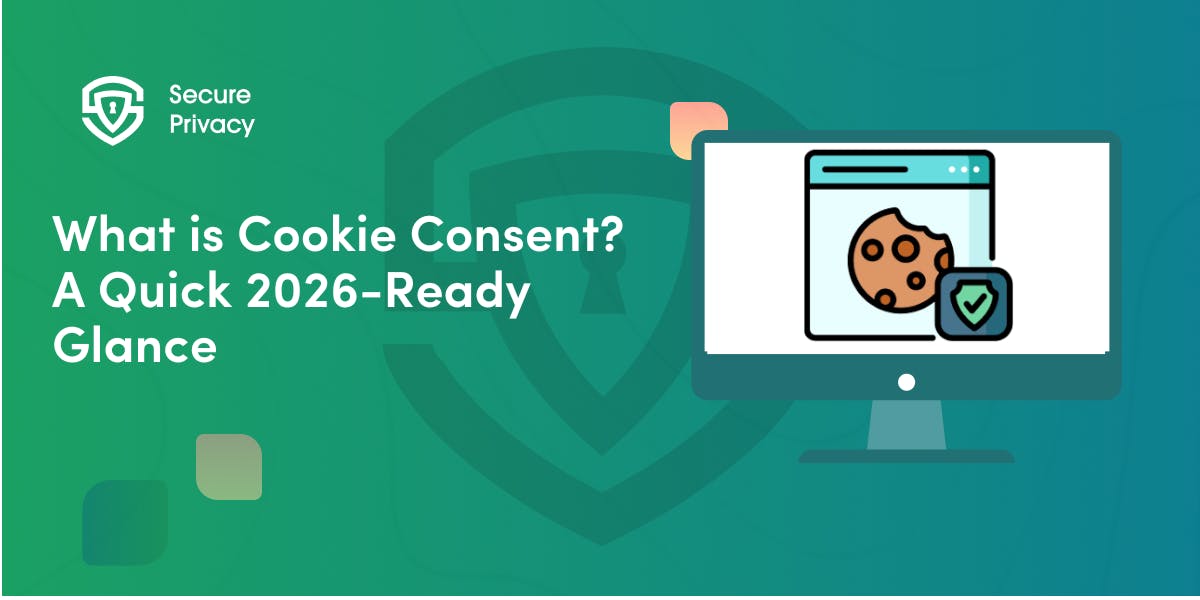
What is Cookie Consent? A Quick 2026-Ready Glance
Your website loads. Cookies track users. But without proper cookie consent, you're violating GDPR — risking fines up to €20 million or 4% of global revenue. Cookie consent is the legally required mechanism by which websites obtain explicit user approval before deploying non-essential tracking technologies. This requirement stems from GDPR Article 4(11) and the ePrivacy Directive, mandating that consent must be freely given, specific, informed, and unambiguous.
- Legal & News
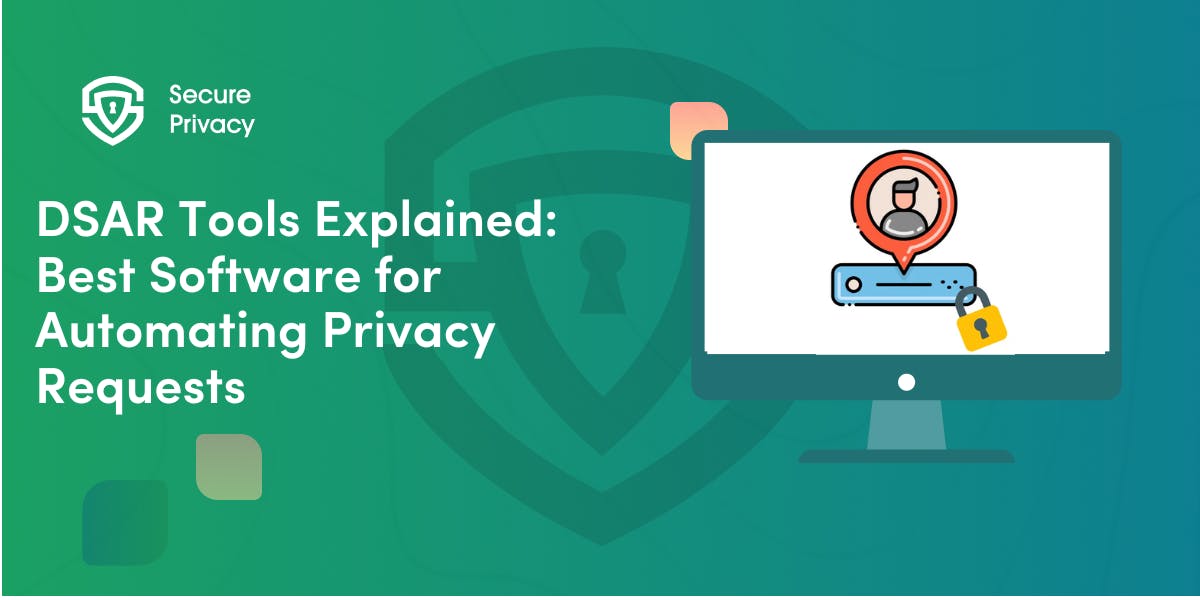
DSAR Tools Explained: Best Software for Automating Privacy Requests
You're drowning in data subject access requests. Manual searches through dozens of systems miss regulatory deadlines and expose organizations to fines starting at $2,500 per violation. The solution? DSAR tools — purpose-built software that automates the entire process of responding to data subject access requests, from intake to delivery.
- Legal & News

